|
|
|
Sort Order |
|
|
|
Items / Page
|
|
|
|
|
|
|
| Srl | Item |
| 1 |
ID:
164246
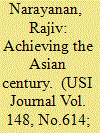

|
|
|
|
|
| Summary/Abstract |
From the dawn of history Asia had dominated the world trade and the global space due to its rich heritage, mature civilizations and its socio-cultural values. However, internal fissures and struggles, lack of strategic vision and a certain level of complacency led to the stagnation of innovation. They were thus left behind in the revolutions in economic and military affairs leading to their colonisation, economic depredation and penury. However, post-independence the robust economic rise of Asian economies since the late 1970s – the opening up of China, under Deng Xiaoping, to US to garner economic support in the late 1970s, the Japanese economic juggernaut, the rise of the Asian Tigers and the opening up of India’s economy in the 1980s and 90s led to the concept of ‘The Asian Century’ in the 21st Century. the gradual shift in the maritime trade centre of gravity to the Indo-Pacific Region symbolises this view despite scepticism in the West.
|
|
|
|
|
|
|
|
|
|
|
|
|
|
|
|
| 2 |
ID:
128957


|
|
|
|
|
| Publication |
Canberra, Government Publication, 2012.
|
| Description |
v, 312p.Pbk
|
| Contents |
White Paper October 2012
|
|
|
|
|
|
|
|
|
|
|
|
Copies: C:1/I:0,R:1,Q:0
Circulation
| Accession# | Call# | Current Location | Status | Policy | Location |
| 057688 | 327.9405/GOV 057688 | Main | On Shelf | Reference books | |
|
|
|
|
| 3 |
ID:
086365
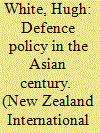

|
|
|
|
|
| Publication |
2009.
|
| Summary/Abstract |
Back in 2000,almost ten years ago now, New Zealand and Australia each took a hard look at their respective defence policies, and made some important changes.Now,on both sides of the Tasman we are dong it again, as new governments in Wellington and Canberra fulfil election promises to produce new defence white paper.
|
|
|
|
|
|
|
|
|
|
|
|
|
|
|
|
| 4 |
ID:
138620
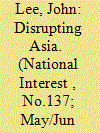

|
|
|
|
|
| Summary/Abstract |
OWEN HARRIES, the first editor, together with Robert Tucker, of The National Interest, once reminded me that experts—economists, strategists, business leaders and academics alike—tend to be relentless followers of intellectual fashion, and the learned, as Harold Rosenberg famously put it, a “herd of independent minds.” Nowhere is this observation more apparent than in the prediction that we are already into the second decade of what will inevitably be an “Asian Century”—a widely held but rarely examined view that Asia’s continued economic rise will decisively shift global power from the Atlantic to the western Pacific Ocean.
|
|
|
|
|
|
|
|
|
|
|
|
|
|
|
|
| 5 |
ID:
154722
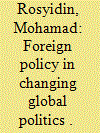

|
|
|
|
|
| Summary/Abstract |
Since President Jokowi came to power in October 2014, Indonesia’s foreign policy has undergone fundamental change, most obviously in the state’s emphasis on domestic priorities rather than global engagement. Although Jokowi’s foreign policy has pursued an ‘active’ principle by participating in many international forums, it seems to have overlooked the changing contexts of the geopolitical turn. Asia has been rising and is becoming the geopolitical center of gravity in the 21st century. Yet, instead of adapting to this shift, Indonesia’s foreign policy continues to neglect the ‘Asian Century’ turn that has been taking place for years. Indonesia should have increased its international profile to enhance its status as a ‘Third Asian Giant’ beside China and India, but Jokowi’s administration has not taken such an opportunity. This article argues that Indonesia is not interested in gaining international status because of the domestically focused nature of its foreign policy. Indonesia is seen as needing to consolidate its own national resilience before asserting itself in a wider international arena. For Jokowi, national interest is defined as material—primarily economic—interest. In addition, Indonesia’s traditional status as a regional, middle level international power prevents the country from seeking any greater global status. This article argues, with optimism, that Indonesia should seek to change this traditional paradigm of middle power status. It suggests that the assertion of global status matters in Indonesia’s foreign policy because the better the country’s position in the international hierarchy of states, the easier it will be for the nation to achieve its own domestic interests.
|
|
|
|
|
|
|
|
|
|
|
|
|
|
|
|
| 6 |
ID:
158388
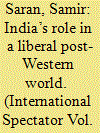

|
|
|
|
|
| Summary/Abstract |
After a period of significant gains, achieved largely through the establishment of institutions that promoted international liberalism, the global order today finds itself at a crucial juncture. Rising inequality, the proliferation of nationalist politics, technology-induced disruptions and the resurgence of zero-sum geopolitics, are all beginning to shake the foundations of the global governance architecture built assiduously over the past 70 years. It is clear that the liberal order, as it is frequently referred to, will not be able to sustain its influence in the 21st century unless it finds new torchbearers in Asia, where politics and economics are scripting a story very different from that of post-war Europe. To some, it is evident that India, which has successfully combined economic growth with its own liberal traditions, will indeed be the heir to and guarantor of this system as an emerging and leading power.
|
|
|
|
|
|
|
|
|
|
|
|
|
|
|
|
| 7 |
ID:
143997


|
|
|
|
|
| Summary/Abstract |
India’s Act East policy and Prime Minister Modi’s Make in India drive coincide with the shifts in the Japanese post-war security policy and the April 2014 easing of the self-imposed arms export ban. Departure in Japan’s policy position on transfer of defence equipment and technology has raised India’s hopes about new vistas of high-end defence technology cooperation.
|
|
|
|
|
|
|
|
|
|
|
|
|
|
|
|
| 8 |
ID:
096027
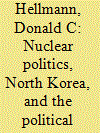

|
|
|
| 9 |
ID:
128515
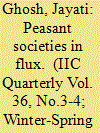

|
|
|
| 10 |
ID:
141602


|
|
|
|
|
| Summary/Abstract |
Somewhere between the foreign visits and eloquent speeches, Prime Minister Narendra Modi managed to alter – albeit slightly – the narrative about India’s status in the international order. Thanks to the reach of social media and the internet generation, it is safe to say, that, India has managed to capture global attention. Will this attention grabbing strategy translate to changes on ground? Will India soar above its present status as a dominant power in South Asia to emerge as a Great power in the future? Can India take charge of the ‘Asian Century’?
|
|
|
|
|
|
|
|
|
|
|
|
|
|
|
|
| 11 |
ID:
138978
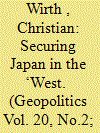

|
|
|
|
|
| Summary/Abstract |
Why has the military dimension of the US-Japan relationship remained the central point of reference for Japanese foreign relations, despite the demise of the Soviet Union? Why has Japan, deepening economic interdependence notwithstanding, remained politically distant from East Asia? Based on analysis of statements by Japanese and US political elites and academics regarding the US-Japan alliance, this article argues that the rise of China, coterminous with the rise of ‘Asia’, challenges the notion of the ‘West’ as, according to standards of industrial modernity, a superior social and political order. These moving ideational boundaries question Japan’s position as the most advanced Asian nation and member of the (Western) international society of states. Therefore, the US-Japan alliance has since the mid-1990s become increasingly important for securing Japan in the ‘West’ and the ‘West’s boundaries in East Asia.
|
|
|
|
|
|
|
|
|
|
|
|
|
|
|
|
| 12 |
ID:
179207
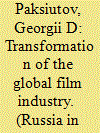

|
|
|
|
|
| Summary/Abstract |
The current rapid development of some Asian economies and the projected economic dominance of Asia in the 21st century are reasons enough to call it “the Asian century.” But will Asia’s economic growth entail an increase in political power and cultural influence? In this article the author looks at the topic through the lens of the film industry, a field of activity with a plethora of intertwined economic, political, and cultural factors. Cinema is studied here as an industry that produces “meanings” and is coupled with the concept of “strategic narratives.” According to some statistics, Asian cinema is becoming increasingly important in terms of the size of national film markets, but for a variety of reasons the U.S. remains the world’s most important exporter of motion pictures. The position of Asian countries in world cinematography is undermined by such global institutions as award ceremonies and film festivals that are held in the U.S. and Europe and tend to favor Western filmmakers. This article emphasizes the dramatic influence of digital transformation on modern cinematography and the opportunities it opens up for Asian film producers in creating a new, global streaming services market. Finally, the paper discusses development prospects for the film industries in four Asian leaders in this field—China, Japan, South Korea, and India. Japan and South Korea are likely to increase their cooperation with the U.S. in cinematography. There are great opportunities for cooperation between the film industries of India and China, but they are heavily dependent on political relations between the two nations. China’s film industry is expected to continue to develop rapidly.
|
|
|
|
|
|
|
|
|
|
|
|
|
|
|
|
|
|
|
|
|